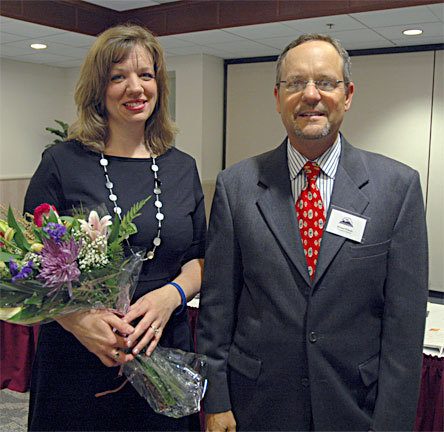SMOKEY POINT — The Arlington-Smokey Point Chamber of Commerce marked a change in its leadership, and opened the floor to an area elected leader, at its July 14 general luncheon in the Medallion Hotel.
Paul Graves delivered farewell remarks to Jennifer Shaw, the Chamber’s outgoing executive director, and welcomed Michael Prihoda as its incoming executive director.
“She’s going to become a full-time mom,” Graves said of Shaw. “She’s done an outstanding job for us for the past several years, during some challenging times. Merging the two chambers was chaos, but she endured it and helped manage the process.”
“These three years have been a tremendous opportunity,” Shaw said, after being handed two flower bouquets. “I’ve learned so much, as I’ve gotten to know all of you, and I can’t say ‘thank you’ enough.”
Graves introduced Prihoda as a former professor at South Seattle Community College and an associate broker at John L. Scott Real Estate, whom he deemed “a great guy.” For his part, Prihoda considered his new role an “honor,” and stated that he was looking forward to where it would take both him and the Chamber.
State Rep. Kirk Pearson then stepped up to offer the luncheon’s attendees an update on the 2009 Legislative session, promising that he would not “candy-coat” his frustration at a number of events that occurred in the state House.
“Frustrated” was one of the words that recurred throughout Pearson’s remarks, starting with his explanation of how the state’s public works trust fund account fund was “raided” in order to make up for the shortfall in its operating budget.
“The capital budget is important for construction projects and low-interest loans to cities like Arlington,” Pearson said. “We had a gap of $9 billion in the general fund. Back in 2003, we had to fill in for $2.3 billion, and we barely knew how to tackle that monster.”
Pearson expressed his support for state parks, which he described as “jewels,” but he also criticized an estimated $109 million purchase of new land for them, including “$15 million for islands that you can’t even sail to,” since this purchase was made at the same time that a number of state parks were facing the prospect of closures due to insufficient funds.
Pearson described the current economic downturn as the result of “where years of regulations have put us,” since “government gives us good things, but it also exists to perpetuate itself.” At the same time, he cited the number of lawsuits that have been leveled at the state Department of Social and Health Services as an example of the need for greater accountability in government, and noted that there had been “bipartisan support” for a plan to break DSHS into four separate agencies, before it was tabled by the Governor’s office.
“I’m in the minority party, and I believe in working within the system,” Pearson said. “I’m not there to throw grenades, but I get frustrated when government seeks to protect itself, rather than dealing with its problems.”
Pearson asserted that regulations are part of the problems facing health care, as well, by pointing out the departure of a number of insurance providers from the state over the years. He likewise warned that the adoption of a “cap and trade” approach to pollutant emissions standards would be so “convoluted” as to “destroy the economy.”
Among the further frustrations listed by Pearson were two bills submitted on the last day of the Legislative session, one which he objected to on the grounds that it weakened state sentencing time requirements “across the board,” and another that would have eliminated school levy equalization, which he saw as disastrous for both smaller schools and the school districts as a whole within his legislative district.
Pearson called upon those in business and administration to give him input on their areas of expertise, “so that we can make the state work better.”
“Most of my bills come from my constituents’ ideas,” Pearson said.







